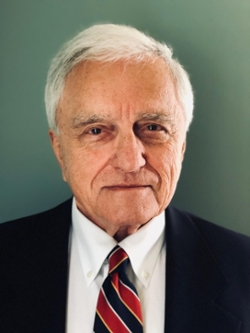Seliga named 2018 electrical engineering OEA
4/2/2018
University Park, Pa. — Thomas Seglia (’61, ’65, M.S. and Ph.D, EE), electronics engineer and scientist at Stinger Ghaffarian Technologies and retired professor and chairman in the Department of Electrical Engineering and Computer Science at the University of Toledo, has been named an Outstanding Engineering Alumnus by Penn State’s College of Engineering.
Seliga’s innovative and pioneering research in the Atmospheric Sciences and Electrical Engineering has been critical to enhancing the utility and precision of weather radar systems around the world, enabling them to: improve the quantitative measurement of rainfall, detect hail and classify other forms of precipitation; further the understanding of precipitation formation; and enable better forecasting and tracking of severe weather events.
His pioneering concepts in polarimetric radar remote sensing techniques for meteorological applications have been implemented operationally in the U.S., Europe and many other countries throughout the world. Seliga also made fundamental contributions to ionospheric wave propagation, including a focus on the effects of high-intensity, high-frequency electromagnetic waves on the ionosphere. He was the first to recognize the importance of critical wave coupling and effects of high-intensity standing waves on the propagation of radiowaves. The Russian Radiophysical Research Institute has credited him with recognizing the possibility of creating artificial periodic inhomogeneities of the ionospheric plasma that then helped lead them to a new method of experimentation that is now performed at ionospheric heating facilities throughout the world.
After completing his B.S. in Electrical Engineering from Case Institute of Technology, Seliga came to Penn State and earned his M.S. in 1961 and Ph.D. in 1965. Most of his career was spent in academe as a Professor of Electrical Engineering and working in administrative positions at Penn State, as Associate Dean for Research and Graduate Studies in the College of Engineering; as Director of the Atmospheric Sciences Program at Ohio State, as Chairman of Electrical Engineering at the University of Washington and as Chairman of the Department of Electrical Engineering and Computer Science at the University of Toledo. He served as an Electronics Engineer at the U. S. Department of Transportation’s Volpe National Transportation Systems Center from 1998-2010 where he contributed to the development and implementation of aviation-related weather sensors and systems as well as radar systems for detecting aircraft on runways for the Federal Aviation Administration.
He also engaged in public-private sector partnerships, one of which led to the highly successful development and implementation of the radar-based Tall Vessel Detection System (TVDS) for ship tracking and measurement of ship heights that are reported and used by air traffic controllers to help ensure safe takeoff and landings at Boston’s Logan International Airport.
Additionally, Seliga served as the Program Director for Aeronomy at the National Science Foundation and held short-term, Visiting Scientist positions at the National Center for Atmospheric Research, the National Weather Service and the Italian National Research Council’s Institute for Atmospheric Science and Climate. Since his retirement in 2010, Seliga occasionally works as a consulting electrical/electronics engineer and atmospheric scientist.
He lives in Cumming, Georgia north of Atlanta, with his wife, Jane. His two daughters, Cheryl Josefik and Deborah Jackson and their families reside in New Hampshire and Georgia, respectively.




